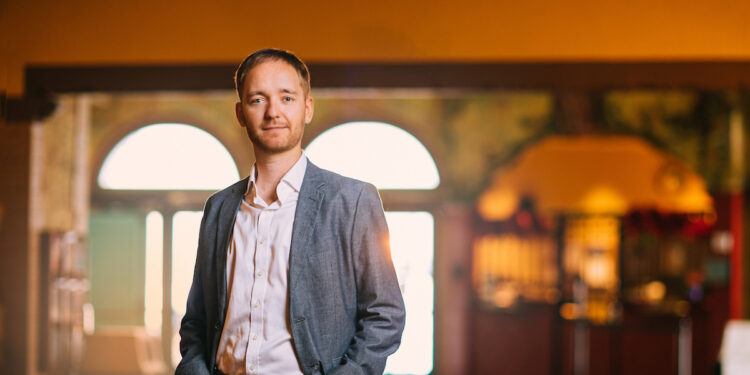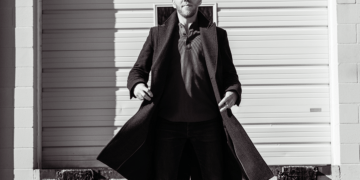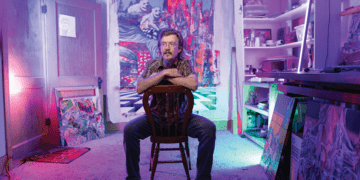After sampling them all, Matthew Gutschick found an artistic medium that spoke to him at age 8. It continues to speak to him as an adult.
br
Gutschick’s mother is a ceramics artist. Raising Matthew and his two brothers, she wanted to make sure that in all their extracurriculars, they had at least one artistic activity. They tried painting, dancing, even exercise videos. Theater was next.
br
“I remember feeling like there was a way of engaging in pretend play with the structure of a story,” he said. “It was pretty electrifying, even at that young age.”
br
That’s why he is invested in doing his work at an intergenerational theater: to give other kids that same opportunity to find their voice and use it to change the world.
br
Gutschick earned his B.A. in communications and theater at Wake Forest University. He also took business classes at the graduate level to gain a better understanding of the management side of arts. While there, he had the incredible experience of learning from Maya Angelou, who was a humanities professor during that time.
br
Every spring, Angelou hosted a course for 30 students focusing on poetry in performance. She shared stories and coached students on how to perform some of her favorite pieces.
br
“Here’s this person who, on day one, knew all of our names,” he said of Angelou. “She impressed upon us that knowing somebody’s name takes a small amount of effort, but is an enormous gesture. [It was] emblematic of her philosophy deeply rooted in an appreciation for what ties us together as human beings.”
br
After graduating, Gutschick worked at a children’s theater in North Carolina. He struggled with how to grow the organization and open it to new plays. So, he went to graduate school to pursue theater management.
br
His MFA program at Yale University represented the evolving conditions of being an artistic director at a larger theater. Yale gave him the opportunity to apprentice with artistic directors, as well as learn from acclaimed playwright Paula Vogel.
br
As fate would have it, The Rose Theater was looking for someone with his qualifications shortly after he graduated.
br
“This is an opportunity I’ve had to grow into,” he said. He had expected to serve in other roles for some time before taking on a leadership role.
br
Julie Walker, managing director, has been a close collaborator and partner. “Matt sets the artistic vision, and together we work to fulfill the mission of the theater,” Walker said.
br
That vision manifests visibly in their productions.
br
“It’s very important that there’s a pathway for me to fall in love with material I’m directing—whether being able to personalize it in some way, or recognize how it can inspire or move others.” Gutschick appreciates a challenge as a director, too. “I’m drawn to plays that have something in them that scares me or stretches me.”
br
Gutschick works in close collaboration with directors of educational programs at The Rose to ensure they are speaking to as many children as possible. They want to reduce the barrier of cost when needed, to make sure they do not turn any child away: from tickets to shows to camps and classes. The Rose is unique among professional theaters in that they have dedicated teaching artists among their full-time staff. Often in the world of theater, teachers are contracted. These teaching artists also contribute to mainstage work as actors and directors.
br
At a time when many cultural institutions are confronting histories of systemic racism, Gutschick wants to help make BIPOC communities feel like The Rose is a place that reflects and embraces their experiences. This means more than just inclusive casting practices. For Gutschick, that is not enough.
br
“Our organization has tried to look very hard at ways we can become more anti-racist. That, of course, has included an ambitious learning-based agenda for our staff and board, but also emboldening some of the action steps…deliberately trying to open our doors to more BIPOC artists to collaborate with us.”
br
That is how the “Sharing Our Stories” initiative started. The initiative is open to all local playwrights who have an idea for a children’s play or musical. The Rose will support these playwrights in their artistic development through one-on-one consultation and by providing space and time to workshop the pieces. They will provide an artist stipend. If a play or musical is a good fit for a production at The Rose, they will commission the artist to further develop the project.
br
Gutschick wants to “open our doors to people who want to create work for [children], and uplift voices that have been historically underrepresented on our stage and others.”
br
The Rose has also been working with other children’s theaters to adapt one of Angelou’s lesser-known works, Life Doesn’t Frighten Me. “It feels like a very full-circle moment, working with her estate to try and bring that to the stage.
br
“I’m emerging from shutdown more excited about live theater than I’ve ever been, even as a kid.”
br
That childlike sense of wonder is what The Rose hopes to nurture in their young audiences.
br
“We both believe children can impact and change the world,” Walker said. “Experiencing theater is something we believe every student should have access to—and the benefits of being part of the creative process will stay with them as life skills for a long time.”
br
Visit matthewgutschick.com for more information.













